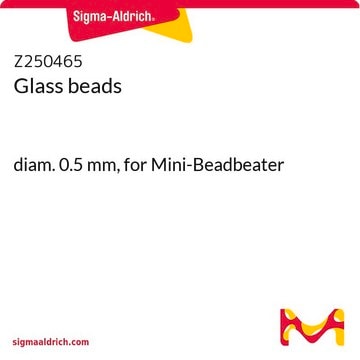G8772
Glass beads, acid-washed
425-600 μm (30-40 U.S. sieve)
Synonym(s):
Acid-Washed Beads, Glass Beads
Sign Into View Organizational & Contract Pricing
All Photos(4)
About This Item
UNSPSC Code:
41102422
NACRES:
NB.22
Recommended Products
particle size
425-600 μm (30-40 U.S. sieve)
Application
Acid-washed glass beads have been used:
- for the extraction of DNA from microalgae
- in the extraction of fatty acids and proteins from yeast cells
- to lyse glioma cell lines to determine the dihydrofolate reductase (DHFR) enzyme activity
Storage Class
11 - Combustible Solids
wgk_germany
nwg
flash_point_f
Not applicable
flash_point_c
Not applicable
ppe
Eyeshields, Gloves, type N95 (US)
Certificates of Analysis (COA)
Search for Certificates of Analysis (COA) by entering the products Lot/Batch Number. Lot and Batch Numbers can be found on a product’s label following the words ‘Lot’ or ‘Batch’.
Already Own This Product?
Find documentation for the products that you have recently purchased in the Document Library.
Customers Also Viewed
Daria Jacob et al.
Malaria journal, 16(1), 259-259 (2017-07-01)
Yeast cells represent an established bioreactor to produce recombinant proteins for subunit vaccine development. In addition, delivery of vaccine antigens directly within heat-inactivated yeast cells is attractive due to the adjuvancy provided by the yeast cell. In this study, Pichia
Yeast engineering to express sex pheromone gland genes of the oriental fruit moth, Grapholita molesta
Vatanparast M and Kim Y
Journal of Asia-Pacific Entomology, 22(3), 645-654 (2019)
Leon M Hartman et al.
Microorganisms, 8(1) (2019-12-28)
Coral bleaching linked to climate change has generated interest in the response of coral's bacterial microbiome to thermal stress. The sea anemone, Exaiptasia diaphana, is a popular coral model, but the response of its bacteria to thermal stress has been
Changyong Cheng et al.
Frontiers in cellular and infection microbiology, 7, 287-287 (2017-07-14)
Microbes employ the thioredoxin system to defend against oxidative stress and ensure correct disulfide bonding to maintain protein function.
A simple and rapid technique for the isolation of DNA from microalgae 1
Fawley M W and Fawley K P
Journal of Phycology, 40(1), 223-225 (2004)
Our team of scientists has experience in all areas of research including Life Science, Material Science, Chemical Synthesis, Chromatography, Analytical and many others.
Contact Technical Service












